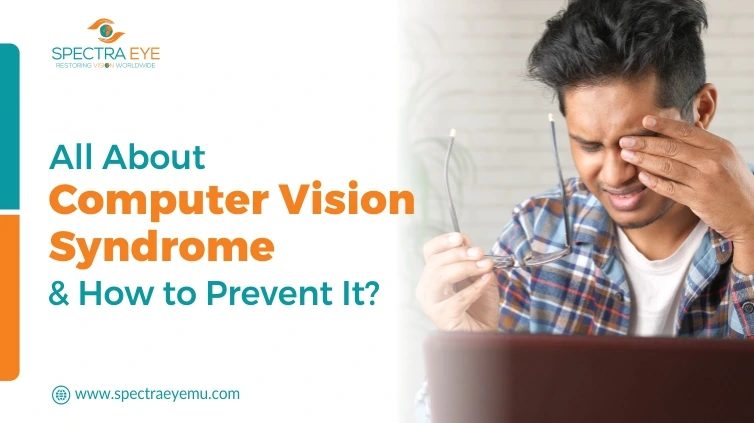Blogs

All About Computer Vision Syndrome & How to Prevent It?
Nowadays, you can see one thing that is very common all around the world and it is the use of technology and watching continuous screens. This aspect is very often for those who indulge in their jobs or spend their free time playing games on the computer, this prolonged screen time activity easily causes them Computer Vision Syndrome (CVS), also known as Digital Eye Strain. This condition affects both your eyes and overall well-being.
If you’re curious, this blog will help you understand what Computer Vision Syndrome (CVS) is, its common symptoms, and simple, effective tips to prevent it.
What is Computer Vision Syndrome (CVS)?
Blood clots in the eye can result from various factors, including:
- Definition: CVS is a group of eye and vision-related issues caused by extended screen use.
- Root Cause: Digital screens reduce blinking and force the eyes to work harder to focus.
- Who’s at Risk? Anyone using screens for more than 2 hours a day—so, practically everyone.
Also Read: What is Dry Eyes? Symptoms, Causes and Treatment
Common Symptoms of CVS
- Eye Strain: A tired, sore feeling in the eyes.
- Dry Eyes: Caused by decreased blinking during screen use.
- Blurred Vision: Difficulty focusing, especially after long hours on screen.
- Headaches: Often a result of eye strain and poor posture.
- Neck and Shoulder Pain: Due to poor ergonomics while sitting at a computer.
- Double Vision: Temporary double images due to fatigued eye muscles.
Also Read: Everything You Need to Know About Artificial Eye Drops
Why Screens Affect Our Eyes
- Blue Light Emission: Screens emit blue light, which disrupts sleep cycles and tires the eyes.
- Reduced Blinking: Normally, we blink 15-20 times a minute. This drops to 5-7 during screen time.
- Poor Contrast and Glare: Backlit screens can make it harder for your eyes to focus compared to print.
Also Read: How to Keep Your Eyes Safe in Cold Weather
Prevention Tips for CVS
1. Follow the 20-20-20 Rule
- After every 20 minutes, look at something 20 feet away for 20 seconds.
- This gives your eye muscles a much-needed break.
2. Blink More Often
- Make some effort and keep in mind to blink regularly while using screens.
- Blinking helps moisturize and refresh your eyes.
3. Optimize Your Lighting
- Avoid working in dark or overly bright rooms.
- Use soft, ambient lighting and reduce screen glare with anti-glare filters.
4. Improve Your Ergonomics
- Place the screen 20–28 inches away from your eyes.
- The screen top should be placed at or slightly below eye level.
- Use an ergonomic chair and maintain a neutral neck posture.
5. Adjust Screen Settings
- Increase text size and contrast to reduce strain.
- Set screen brightness similar to your surroundings.
- Use “Night Mode” or blue light filters at night.
Also Read: Eye Safety Tips for Children: How to Protect Your Kids' Vision
Natural Remedies to Ease CVS
1. Cold Compress for Eyes
- Apply a cold, damp cloth over closed eyes for relief from strain and puffiness.
2. Cucumber or Green Tea Bags
- Place chilled cucumber slices or used green tea bags on your eyes for 10 minutes.
- Helps soothe and relax tired eyes naturally.
3. Eat Eye-Friendly Foods
- Include foods rich in Vitamin A, C, and Omega-3s like carrots, spinach, almonds, and salmon.
- These nutrients support eye health and reduce fatigue.
Also read: How to Manage Eye Health During Pregnancy: Common Issues and Solutions
How to Reduce Screen Time
1. Schedule Screen Breaks
- Set alarms or app reminders to take breaks throughout the day.
- Step outside for a walk or just rest your eyes.
2. Digital Detox Before Bed
- Avoid screens at least 1 hour before sleep.
- Use this time to read a physical book or practice mindfulness.
3. Use Apps to Monitor Usage
- Apps like “Digital Wellbeing” help track daily usage.
- You can set time limits on specific apps to prevent overuse.
Also read: Common Eye Diseases and Their Treatments
When to See an Eye Doctor
- If symptoms persist despite lifestyle changes, it’s time for a professional check-up.
- Optometrists can suggest prescription glasses with blue light filters or other vision correction options tailored to screen usage.
Also read: Benefits of Laser Eye Surgery and How to Recover
The Future of Eye Health in a Digital World
As remote work, online learning, and digital entertainment continue to grow, CVS is becoming a global concern. Fortunately, the solution lies not in quitting screens but in adopting smarter habits.
Modern technologies such as screen dimming software, AI-based posture correctors, and smart glasses are already making it easier to prevent digital eye fatigue.
Final Thoughts: Your Eyes Deserve a Break
Computer Vision Syndrome may be common, but it’s not something you have to live with. By following simple eye care habits, ergonomic tips, and mindful screen practices, you can protect your vision while staying productive. However, regular checkups at a trusted eye hospital like Spectra Eye Hospital in Mauritius can help you achieve quality vision and provide you proper guidance.